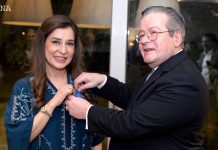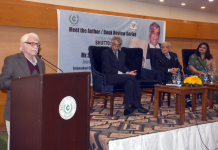ISLAMABAD, NOV 11 /DNA/ – I am pleased to join you for the launch of the U.S.-funded Climate Smart Agriculture Activity. Through this five-year investment, the United States will partner with farmer organizations, local businesses, and research institutions. We will focus on better farming practices and technology; new digital tools; and assistance with business models, financing, and international connections. These programs will improve crop yield while helping the environment – and putting more money in farmers’ pockets. Together, we’re planting the seeds of success.
First, we will ensure Pakistani farmers can access cutting-edge agricultural technology to improve productivity. This includes supporting partnerships among researchers, businesses, and farmers’ organizations to ensure that newly-developed, improved seeds are available to farmers. We will work with farmers to introduce modern machinery that will improve the efficiency and effectiveness of the planting process. We will also introduce automated irrigation systems to ensure water is used effectively, which is crucial in regions dealing with water scarcity. We will also make new technology available for crop monitoring, farm management, and weather forecasting. All of this translates into more productive crops.
Next, we will help farmers bring their goods to market and maximize their profits. We will do this by connecting farmers with financial services to help them buy better seeds, tools, and machinery. We will also provide instruction in marketing to make sure Pakistani farmers are getting the best price possible. We will also help farmers find the right buyers by connecting them directly with businesses, cooperatives, and online platforms. This ensures they don’t lose money by waiting too long to sell or going through middlemen. Overall, this means more crops are sold, faster and at better prices.
The United States and Pakistan have a long and strong partnership in agriculture. Over half a century ago, a U.S. scientist partnered with Pakistani colleagues to revolutionize agriculture here and around the world. The story of Dr. Norman Borlaug and his work with Dr. Mohammad Manzur Bajwa is one of an enduring U.S.-Pakistani partnership helping to bind our two countries together in friendship. The resulting strain of wheat enabled Pakistan to double its wheat production between 1965 and 1970. This extraordinary yield was known as the “Green Revolution” – a term coined in 1968 by USAID administrator William Gaud.
Our partnership didn’t stop there. As Dr. Borlaug worked on wheat yields, American and Pakistani scientists working at the University of California, Riverside developed the Kinnow. They shared it with their Pakistani colleagues at the University of Agriculture, here in Faisalabad, who perfected methods to grow some of the sweetest citrus in the world. Today, the Kinnow is known and loved throughout Pakistan, and exported around the world.
From there, our collaboration continued to grow and flourish. In 1977, the United States supported the establishment of the National Agricultural Research Center and endowed funds that support critical agricultural research in Pakistani universities and research institutions. And, of course, the United States helped build this great university and continues to support it through an endowment and research projects.
This robust partnership helped transform Pakistan from a food-insecure country to a net food exporter. We continue to build on that success, working with our partners across Pakistan to develop new crop varieties, improve management practices, and increase farmers’ access to new technologies and irrigation water.
Today, we are partnering with Pakistan to respond to climate change. Agriculture both affects — and is affected by –climate change. Unpredictable weather, heatwaves, and irregular rainfall are making it harder for farmers to grow the crops that support their families and feed the nation. We all know how important it is that agriculture in Pakistan continues to grow and thrive.
Together, we’re working to help Pakistan become more resilient to climate threats. Through the U.S.-Pakistan “Green Alliance” framework, the United States is making strategic investments in renewable energy, water management, and smart agriculture to help better position Pakistan to mitigate and adapt, to meet the threat of climate change head-on. We have also contributed $1 billion to the Green Climate Fund and have unlocked millions of these dollars in climate mitigation and adaptation projects to enhance Pakistan’s resilience.
In agriculture alone, our investments have benefited more than one million rural households. We have helped farms and firms increase the value of their sales by more than $1.47 billion and create more than 100,000 new jobs.
From the “Green Revolution” to the “Green Alliance” the United States and Pakistan have worked together to benefit the people of both our countries. I can’t wait to see what discoveries and innovations grow from the seeds we are planting today.

















